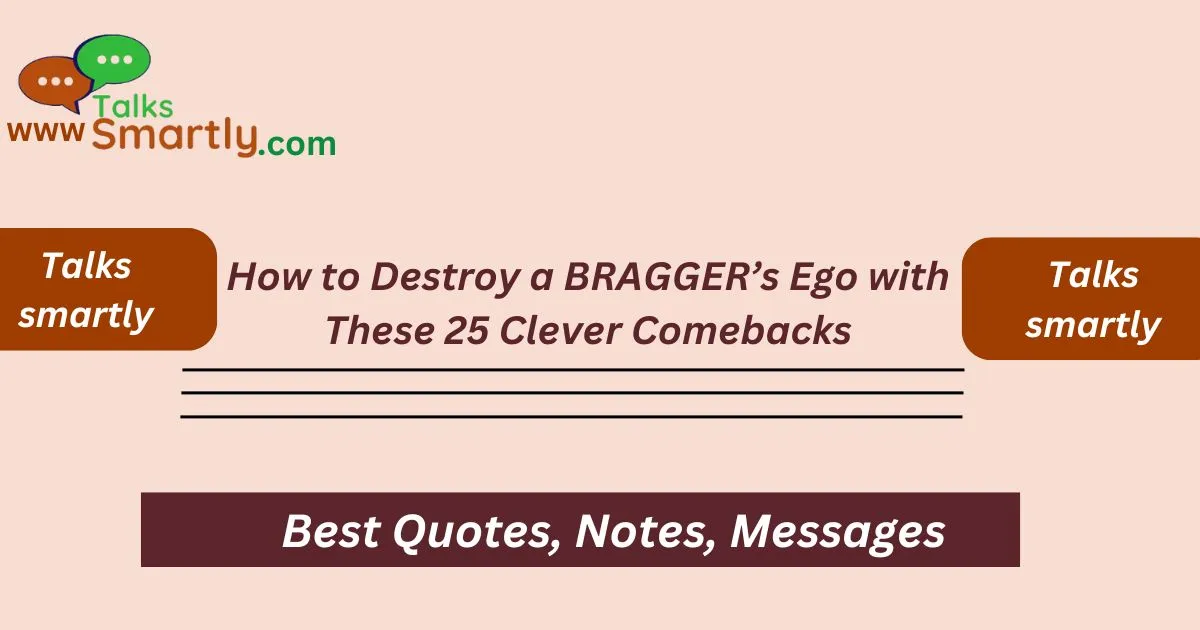Introduction
Handling constant boasting is easier with sharp comebacks like, “Do you carry a mirror to reflect on your greatness?” gracefully deflating their ego while redirecting the conversation smoothly.
Dealing with people who always boast about themselves can be tricky. Whether it’s at work, with friends, or even online, handling someone who constantly talks about their achievements requires tact and smart responses.
This article provides practical tips and witty comebacks to help you deflate their ego gracefully and maintain harmony in conversations.
Witty Comebacks to Outsmart the Braggers
- “You know, humility is a virtue. Maybe give it a try sometime.”
- Suggesting that modesty is more admirable than excessive self-promotion.
- “Wow, do you carry a mirror to reflect on your greatness?”
- Playfully pointing out their self-centeredness.
- “Impressive. Can you email me a detailed list of all your achievements?”
- Challenging them to substantiate their claims.
- “Must be exhausting carrying all that ego around.”

- Indicating the burden of their self-inflation.
- “You should get that printed on a T-shirt. It’s almost as big as your ego.”
- Humorously suggesting they wear their achievements.
- “That story gets more impressive each time you tell it.”
- Acknowledging their repetitive boasting.
- “Have you considered running for president of the Braggers Club?”
- Teasingly suggesting they could lead their own group.
- “Your modesty is truly inspiring.”
- Using sarcasm to highlight their lack of humility.
- “I’ve never heard anyone brag so quietly before.”
- Pointing out their not-so-subtle self-promotion.
- “Do you ever get tired of talking about yourself?”
- Directly questioning their incessant self-focus.
- “That’s impressive. Are you looking for a standing ovation?”
- Mockingly suggesting they seek applause for their achievements.
- “I didn’t realize we were in a competition.”
- Indicating discomfort with their constant comparison.
- “Is there an achievement award for talking about achievements?”
- Highlighting the irony in their self-centeredness.
- “You should patent that. It’s the best self-promotion I’ve seen.”
- Acknowledging their skill in self-advertisement.
- “Do you have a fan club for your ego?”

- Jokingly suggesting they have admirers of their self-importance.
- “I think I’ve heard this one before. What’s new?”
- Politely indicating their repetition without encouragement.
- “Your resume must be the size of a phone book.”
- Humorously exaggerating the extent of their self-promotion.
- “You should host a seminar on self-confidence.”
- Suggesting they channel their energy into teaching others.
- “I’ll need a bigger hat for all the hats you wear.”
- Playfully acknowledging their many roles and achievements.
- “Have you ever considered a career in motivational speaking?”
- Encouraging them to use their enthusiasm positively.
- “Your confidence is inspiring. I might need to take notes.”
- Acknowledging their self-assurance with subtle sarcasm.
- “Do you have a personal cheerleader for all your achievements?”
- Jokingly suggesting they have someone cheering for their success.
- “You should write a book about yourself. It would be a bestseller.”
- Encouraging them to document their achievements.
- “I’m impressed. You must practice that speech in the mirror.”
- Playfully suggesting their boasting is rehearsed.
- “You’ve really mastered the art of self-promotion.”
- Acknowledging their skill in drawing attention to themselves.
Surprising Ways to Answer “Where Do You Work?” to Impress Anyone!
- “Do you get royalties every time you mention your achievements?”
- Humorously suggesting they profit from their self-promotion.
- “You should give TED talks on your life achievements.”
- Encouraging them to share their story in a structured format.
- “I think I’ve seen your resume on a billboard.”
- Playfully exaggerating the visibility of their achievements.
- “You must have a trophy room for all those accomplishments.”
- Imagining a space dedicated to their successes.
- “I hope you have room for all those awards on your mantle.”
- Playfully suggesting they display their achievements prominently.
- “You’re the best self-promoter I’ve met.”
- Acknowledging their talent for promoting themselves.
- “Your LinkedIn profile must be a novel.”
- Suggesting their online presence is extensive.
- “Do you have a PR team managing your image?”
- Humorously suggesting their self-promotion is professionally managed.
- “Do you ever get stage fright from all the attention?”
- Playfully suggesting they thrive on being in the spotlight.
- “You should enter the Guinness World Records for most self-praise.”
- Jokingly suggesting they set a record for their boasting.
Tips for Dealing with Braggers

- Redirect the Conversation
- Guide the discussion towards broader topics to shift focus away from their boasting.
- Lead by Example
- Demonstrate humility and modesty in your own demeanor.
- Set Boundaries
- Politely but firmly indicate when their bragging becomes excessive.
Conclusion
Navigating conversations with braggarts can be challenging, but with the right approach, you can manage their behavior effectively. Using clever comebacks not only addresses their boasting but also encourages humility and respectful dialogue.
Remember, responding with humor and intelligence can turn potentially awkward situations into opportunities for better understanding and connection.












